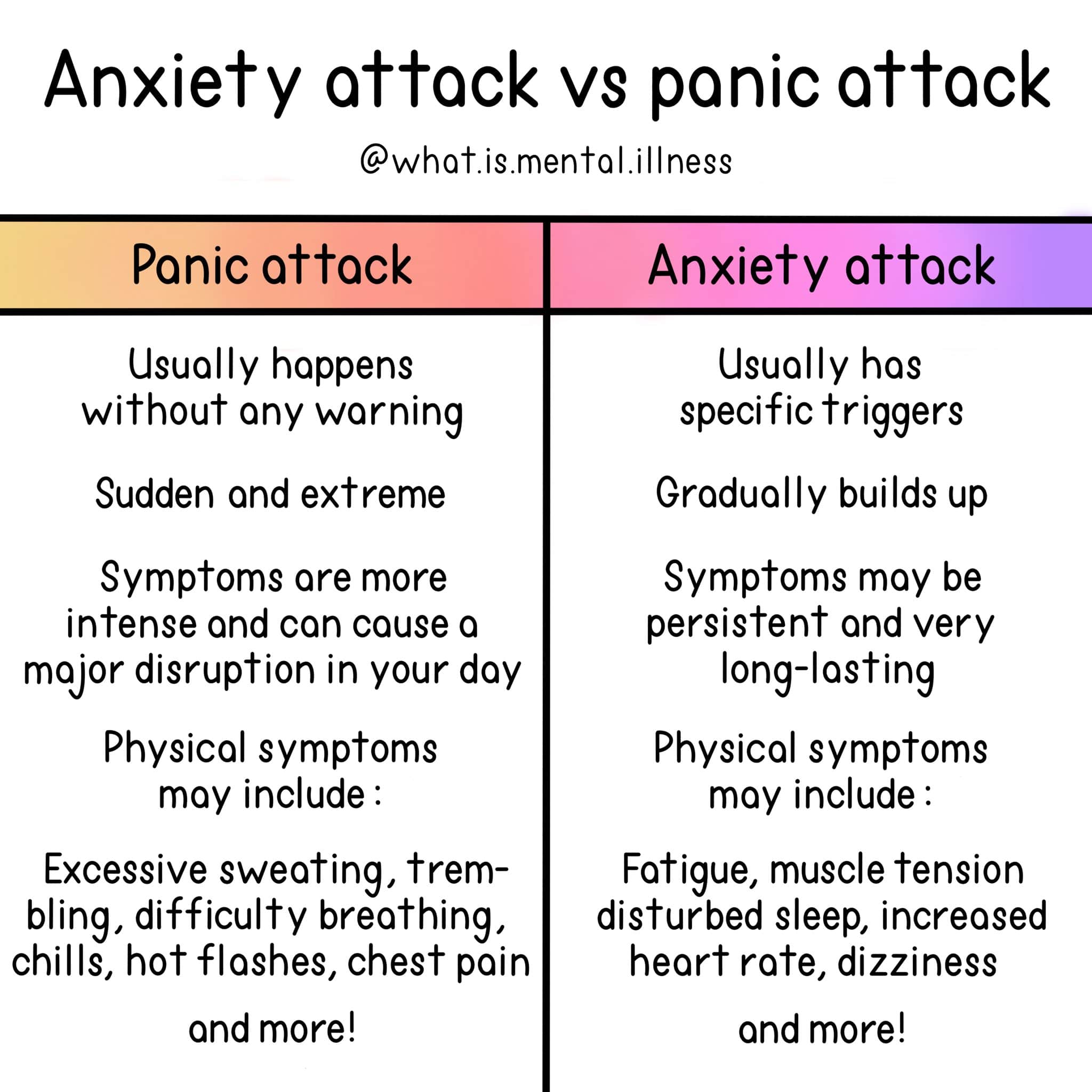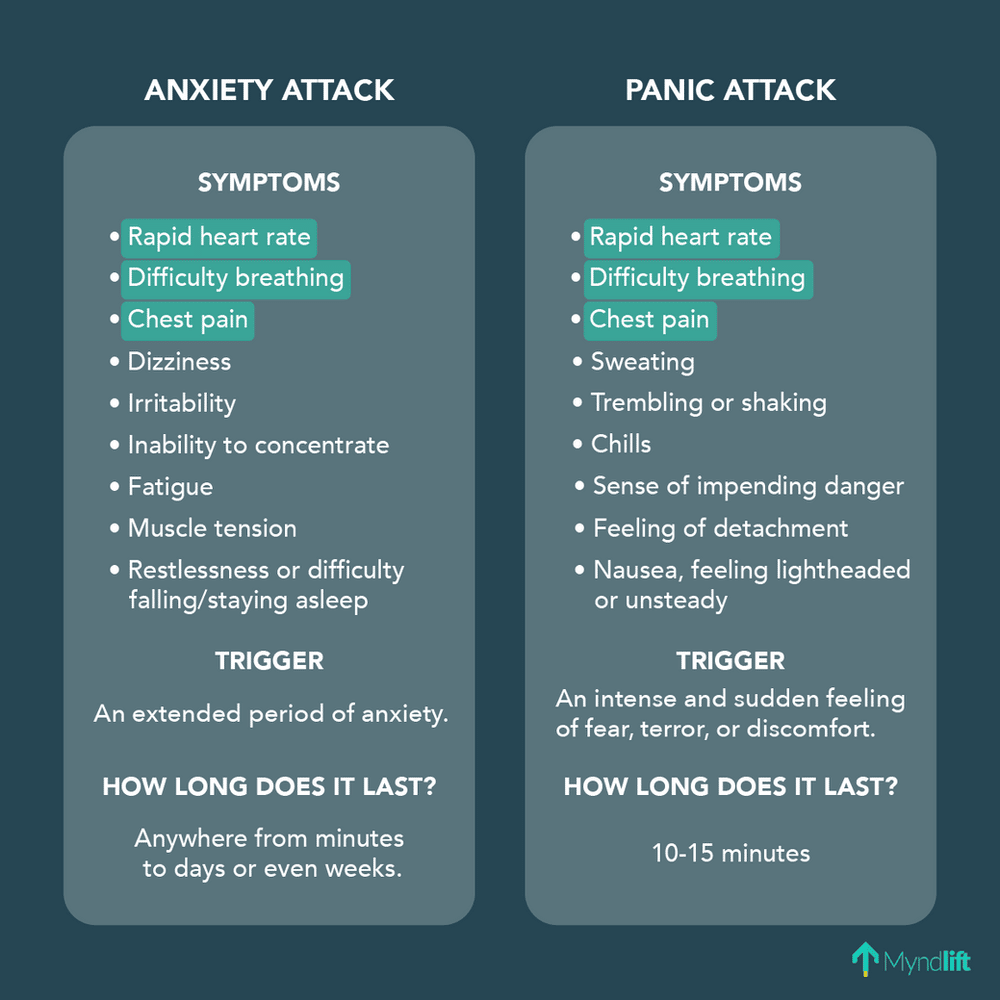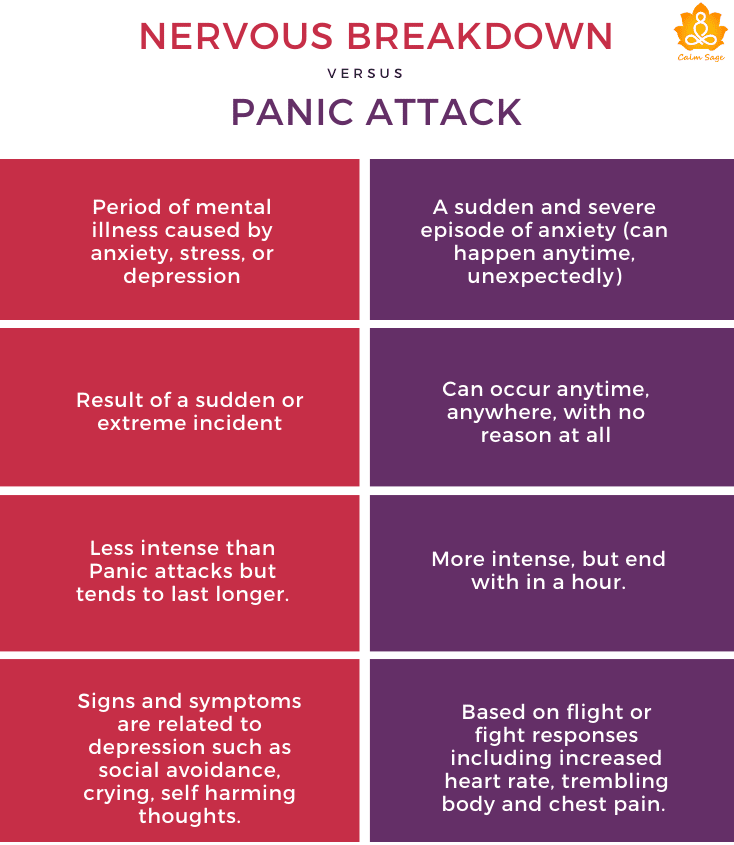During A Panic Or Anxiety Attack
The following strategies can help during an attack:
- Acknowledgment: The symptoms of a panic or anxiety attack can be extremely frightening. Acknowledging the situation and remembering that symptoms will soon pass can reduce anxiety and fear.
- Breathing techniques: Difficulty breathing is among the most common and alarming symptoms of these attacks. Learning techniques to control breathing can help during an attack.
- Relaxation techniques: Methods of relaxation, such as progressive muscle relaxation and guided imagery, can reduce feelings of panic and anxiety.
- Mindfulness: Mindfulness helps people stay grounded in the present moment. It can be especially beneficial for people with anxiety, who tend to worry about perceived and potential stressors.
Medical professionals will assess a persons symptoms and plan treatment accordingly. This will typically center on therapy, medication, or a combination of the two.
Symptoms Of A Panic Attack
Panic attacks differ from anxiety attacks because they occur suddenly and without any signs or warning. A panic attack is a rush of extreme fear, and it can happen as a reaction to something you fear, or it can happen when there is no identified reason to be afraid. Panic attacks can even occur when youre asleep. Theyre considered the bodys false alarm because the attack activates the bodys fight-or-flight response and intensifies it, even when there is no danger.
While anxiety attacks can feel unnerving and uncomfortable, panic attacks are much more intense. Anxiety attacks are difficult to manage, but people can persevere through them. Panic attacks, however, can feel almost impossible to push through. When a person experiences a panic attack, they may feel as if they are having a heart attack, dying or going crazy. Panic attack symptoms include the following:
- Dizziness or feeling light-headed
- Shaking or trembling
- Tingling or numbness
For a healthcare professional to diagnose a panic attack, four or more of the symptoms must occur, but a person having a panic attack will probably not experience all of the symptoms listed at the same time. These symptoms are not life-threatening, but the intense fear during a panic attack can worsen symptoms. People will usually experience symptoms at their worst a few minutes after a panic attack begins, but panic attacks will usually only last about 20 minutes or an hour at the most.
Do I Have An Anxiety Disorder
If you identify with any of the following seven signs and symptoms, and they just wont go away, you may be suffering from an anxiety disorder:
Affordable Online Therapy
Nearly 3 Million people have turned to BetterHelp for professional online therapy. Take the quiz and get matched with a therapist that fits your needs.
- Shaking or trembling.
Because of these physical symptoms, anxiety sufferers often mistake their disorder for a medical illness. They may visit many doctors and make numerous trips to the hospital before their anxiety disorder is finally recognized.
The link between anxiety symptoms and depression
Many people with anxiety disorders also suffer from depression at some point. Anxiety and depression are believed to stem from the same biological vulnerability, which may explain why they so often go hand-in-hand. Since depression makes anxiety worse , its important to seek treatment for both conditions.
Recommended Reading: How Many Veterans Suffer From Ptsd
When Should You Seek Treatment Or Support
Itâs worth looking for help if panic attacks or anxiety attacks are having an impact on your ability to function normally .
If you have started to avoid certain places or situations that this is also a sign to seek help â socializing with certain people, or avoiding places where you have previously had an anxiety attack.
In the short-term, avoiding anxious or fearful situations can make a person feel safe, but this is a problem in the long-term as avoidance can keep people anxious.
What Is An Anxiety Attack

As mentioned previously, an anxiety attack is not a recognized medical condition as defined by the DSM-V. But this doesnt mean that it doesnt exist. Rather it is a term people with anxiety use to describe very intense or extended periods of anxiety.
Many people live with low-level anxiety on a daily basis. But every now and then, their anxiousness may increase, either gradually or suddenly, to a higher level than is usual for them. Symptoms of these anxiety attacks are more severe than the simple feeling of anxiety but less severe than a panic attack and may be short-lived or persist for days, sometimes weeks. Symptoms may include:
- Feeling particularly wound up or on edge
- Feeling irritable
- Difficulty concentrating or periods where your mind goes blank
- Having difficulty controlling worries
Sometimes an anxiety attack is a prelude to a panic attack. For example, some people have experienced anxiety attacks on the way to an airport because they have previously had a panic attack on an airplane.
Anxiety attacks do not necessarily indicate that a person has an anxiety disorder, although anxiety as a symptom is linked to numerous mental health conditions, including depression, obsessive-compulsive disorder, and PTSD. Anxiety is appropriate in some circumstances and anxiety attacks are only more intense forms of that emotion.
You May Like: Do Dogs Have Separation Anxiety
Are Panic Attacks And Anxiety Attacks The Same
We all worry from time to time. Yet panic and anxiety attacks are distinct from normal fear. Theyre accompanied by emotional and physical symptoms that can make it difficult to get on with your day.
Panic attacks appear to come out of nowhere. They are considered to be more intense than anxiety attacks, and usually peak and subside within 10 minutes or so.
Panic attacks are recognized in the Diagnostic and Statistical Manual of Mental Disorders . Theyre linked with panic disorder, which impacts 2.7% of adults in the United States, according to the Anxiety and Depression Association of America .
On the other hand, anxiety attacks arent officially recognized by the DSM-5, so the definition of what constitutes an attack can be a bit vague.
Anxiety attacks are associated with a few conditions, including:
Acknowledge What Is Happening Talk To Yourself
The symptoms of a panic or anxiety attack can be alarming. Acknowledge the situation and remember that signs are temporary and will soon pass can reduce anxiety and fear.
Be kind to yourself, remind yourself that youre okay. If that doesnt work, try playing mental games such as favorite song, place, or alphabet backward.
Read Also: Can You Get Disability For Bipolar
Diagnosis For Panic Attacks And Anxiety Attacks
In the past, it was more difficult to diagnose panic and anxiety attacks. The symptoms that come with them are similar to those of many other illnesses, including heart disease, thyroid disorders, and breathing disorders. If you have an attack, you should see your doctor to make sure that the cause of these symptoms is not a serious medical condition.
If you find yourself having panic or anxiety attacks, or anxiety in general, a therapist or mental health professional can help to pinpoint these causes. They may also be able to help diagnose if you have a panic or anxiety disorder that triggers the attacks.
What Causes A Nervous Breakdown
mental breakdownmentalBreathing exercise for panic attacks
Recommended Reading: What Is An Economic Depression
Physical And Mental Stimulation
One of the best ways to stop or prevent panic attacks is ensuring that your dog is getting enough physical activities. According to this article by Fitzroy Vet Hospital, exercising helps your dog be happier and entertained resulting in lower chances of panic attacks.
In addition, giving your dog puzzle toys that can improve their mental stimulation can also contribute to preventing panic and anxiety attacks. Allotting at least 20 to 30 minutes for daily mental and physical activities is very important.
Similarities Between Anxiety Attacks And Panic Attacks
Panic and anxiety attacks may feel similar, and they share a lot of emotional and physical symptoms.
Anxiety and panic attacks have similar risk factors. These include:
- Experiencing or directly witnessing a trauma or traumatic events
- Going through a stressfullifeevent, eg: the death of a loved one, abuse, divorce, etc
- Ongoing stress and worries, eg: work responsibilities, job loss, conflict in your family, or financial loss
- Enduring a chronichealthcondition
- Being diagnosed or suffering with a lifethreateningillness
- Having a high baseline of anxiety
- Having a differentmentalhealthdisorder, such as depression or OCD
- Closefamily members who have anxiety or panic disorders
- Using drugs or alcohol or living in a household with an addict
Sometimes we need a quickfix, and when panic and anxiety are bringing their worst you dont have time to mess around. I get that, Ive been there. I consolidated some of my favorite resources together and created a FREEanxietywellnessspringboard. The springboard has strategies that work and fast.
Here is what the free springboard includes:
- The 3 Biggest Game Changers For Ditching Anxiety
- Of ALL the therapy, medications, supplements, practices and tools that have supported my patients out from under anxiety, these three have been, BY FAR, the most impactful
Heres to your next chapter,
Dr. Nicole
Read Also: Do Cats Get Depressed After Abortion
Does Prednisone Cause Anxiety Or Panic Attacks
A lot of the Prednisone Warriors have shared that when they are taking prednisone they experienced mood swings. They feel irritable, agitated, hyper, and bad temper!
You might be wondering, whats causing this?
Keeping with our theme of prednisone mood changes, I created a new video to respond to this question:
Also Check: How To Tell If You Have Anxiety
Causes Of Panic Attacks And Panic Disorder

Although the exact causes of panic attacks and panic disorder are unclear, the tendency to have panic attacks runs in families. There also appears to be a connection with major life transitions such as graduating from college and entering the workplace, getting married, or having a baby. Severe stress, such as the death of a loved one, divorce, or job loss can also trigger panic attacks.
Panic attacks can also be caused by medical conditions and other physical causes. If youre suffering from symptoms of panic, its important to see a doctor to rule out the following possibilities:
Read Also: How To Know You Have An Eating Disorder
Treatment For Panic Disorder
The American Psychiatric Association recommends treating patients with panic disorder when symptoms cause dysfunction or significant distress in aspects of an individuals life as their such as work, family life, social obligation, and leisure activities. Benzodiazepines such as Valium are not a first-line recommended treatment approach for individuals with panic disorder and are for individuals who have panic disorder that has not been successfully treated with any other psychotherapy or pharmacological treatment. The first-line treatment for panic disorder is cognitive behavioral therapy with or without medication. Medications that are recommended include antidepressants, specifically selective serotonin reuptake inhibitors .
Seek Positive Ways To Cope
During a panic attack, finding the best coping skills can be challenging, but each person should have a few go-to skills. Calling a friend, performing a relaxation technique, listening to a favorite song, listing the 50 states, or exercising are all wonderful ideas, but each person may respond best to different behaviors, so continue experimenting.
Recommended Reading: What Is The History Of Schizophrenia
What Are Anxiety Attacks
Anxiety attack is not an official clinical term. The latest edition of the Diagnostic and Statistical Manual of Mental Disorders, a book the vast majority of mental health professionals abide by, does not list it. Instead, the term anxiety attack is a colloquial phrase coined by people who have anxiety.
The term anxiety attack is used to describe intense or extended periods of anxiety. An attack is more overwhelming and intense than just having anxiety. But its not as severe as a panic attack. According to her book Stop Anxiety from Stopping You, Dr. Helen Odessky notes that the term anxiety attack became more common because people started feeling like anxiety was interrupting their life. As more and more clients began using it in therapy, mental health professionals began forming a more detailed definition.
Still, while the distinction between anxiety vs. panic attacks has become clearer over time, there isnt yet an official definition for an anxiety attack.
Also Check: Is The Sound Of Silence About Depression
Preventing A Further Attack
It may help to:
- read a self-help book for anxiety based on the principles of cognitive behavioural therapy ask your GP to recommend one
- try complementary therapies such as massage and aromatherapy, or activities like yoga and pilates, to help you relax
- learn breathing techniques to help ease symptoms
- do regular physical exercise to reduce stress and tension
- avoid sugary food and drinks, caffeine and alcohol, and stop smoking, as all they can all make attacks worse
For more help, read how to deal with panic attacks.
You May Like: Is It Adhd Or Bipolar
Symptoms Of Panic Attack
Having panic attacks and anxiety causes your body to go into a fight or flight response. This means that you cannot think clearly or rationally. Instead, you resort to two basic survival responses: either putting your defenses up as a way to survive or fleeing a situation out of intense fear .
The physical symptoms from a panic attack might include:
- Shortness of breath
- Inability to take deep breaths
- Stomach aches and nausea
All of these symptoms are intense and uncomfortable, and if you do not know what it is that your body is experiencing, you might feel that this is a life-or-death situation because of that fight or flight response. You might even think that you are having a heart attack because of the way your body is trying to respond to the high levels of panic.
Its important that you always check in with a doctor when you experience these symptoms, but know that they could also be coming from untreated anxiety and very intense panic attacks.
Remember, too, that panic attacks can happen to anyone. Some people might never experience a panic attack in their lifetime and feelings of anxiety are short lived. Others have chronic anxiety and panic attacks. If youre experiencing panic attacks with any degree of frequency, say more than once a year, you may have an anxiety disorder.
Seek Treatment For Anxiety
Anxiety and panic attacks can occur for many reasons. Sometimes, recurring attacks can indicate the presence of an anxiety or panic disorder. If anxiety or panic attacks are overwhelming you and disrupting your daily life, anxiety treatment services can help.
Taylor Counseling Group provides affordable anxiety counseling. Our therapists will work with you to create a custom treatment plan thats right for you. Schedule an appointment online to start your journey toward healing.
Newer Post:
You May Like: How To Help Yourself With Depression
Mental & Emotional Symptoms
The emotional symptoms of panic attacks include:1
- Extreme fear: Some fear that they are having a heart attack, that they are dying, or that something is seriously wrong with their body. Other people fear that they are losing control of their body, their mind, or that they are going crazy
- Derealization: A sense that a persons surroundings or experiences are unreal or not actually happening
- Depersonalization: A sense or feeling that a person is not connected to their body, they are in a dream, or that they are observing their actions from outside of the body.
- Intense worry about the next panic attack and the possible outcomes
- Strong urge to flee the situation to find safety
Panic Attack Vs Anxiety Attack: What Is The Difference

Are you looking for the difference between a panic attack and an anxiety attack? If yes, we will help you find where the difference actually lies.
Have you ever heard of panic attack and anxiety attack? Many people think it is the same concept and holds the same meaning but are you aware that Panic Attack vs Anxiety Attack is a different concept. Are you looking for the difference between panic attack and anxiety attack? If yes, we will help you find where the difference actually lies. Both the terms panic attack and anxiety attack sound similar but they are not similar. Instead, there lies a thin line that differentiates both the terms from each other. In this piece, we will tell you about the difference between panic attack and anxiety attack. Moreover, the difference lies in signs of a panic attack and anxiety attack and their causes as well. But the initial difference begins in the meaning only. So, before moving into deep understanding let’s first know about what panic attack and anxiety attack actually is.
Recommended Reading: Can Low Thyroid Cause Anxiety